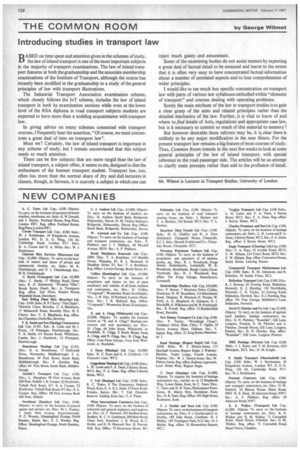Introducing studies in transport law
Page 128

If you've noticed an error in this article please click here to report it so we can fix it.
BASED on time spent and attention given in the schemes of study, the law of inland transport is one of the most important subjects in the majority of transport examinations. The law of inland transport features in both the graduateship and the associate membership examinations of the Institute of Transport, although the course has recently been modified in the graduateship to a study of the general principles of law with transport illustrations.
The Industrial Transport Association examination scheme, which closely follows the loT scheme, includes the law of inland transport in both its examination sections while even at the lower level of the RSA diploma in road transport subjects students are expected to have more than a nodding acquaintance with transport law.
In giving advice on many schemes connected with transport courses, I frequently hear the assertion, "Of course, we must concentrate a great deal of time on transport law".
Must we? Certainly, the law of inland transport is important in any scheme of study, but I remain unconvinced that this subject needs so much attention.
There can be few subjects that are more turgid than the law of inland transport, a subject often, it seems to me, designed to dim the enthusiasm of the keenest transport student. Transport law, too, often has more than the normal share of dry and dull lecturers in classes, though, in fairness, it is scarcely a subject in which one can inject much gaiety and amusement.
Some of the examining bodies do not assist matters by expecting a great deal of factual detail to be amassed and learnt to the extent that it is often very easy to have concentrated factual information about a number of unrelated aspects and to lose comprehension of wider principles.
I would like to see much less specific concentration on transport law with parts of various law syllabuses embodied within "elements of transport" and courses dealing with operating problems.
Surely the main attribute of the law in transport studies is to gain a clear grasp of the aims and related principles rather than the detailed mechanics of the law. Further, it is vital to know of and where to find details of Acts, regulations and appropriate case law, but is it necessary to commit so much of this material to memory
But however desirable these reforms may be, it is clear there is unlikely to be any major modification in the near future. For the present transport law remains a big feature of most courses of study. Thus, Common Room intends in the next few weeks to look at some general principles of the law of inland transport, with special reference to the road passenger side. The articles will be an attempt to clarify main precepts rather than add to the profusion of detail.
















































































































































































